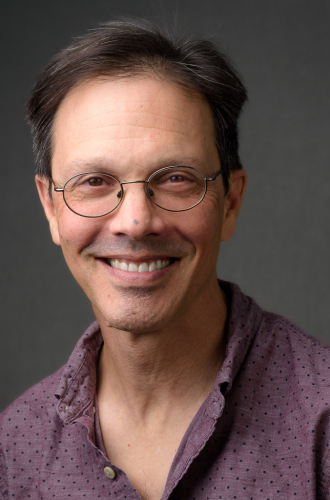-

-

-
Nace L Golding
Professor
Department of NeuroscienceTo understand how sensory systems function and developgolding@austin.utexas.edu
Phone: 512-232-4888
Office Location
NHB 3.342
Postal Address
100 E 24TH ST
AUSTIN, TX 78712-
-
Nace Golding is a Professor in the Department of Neuroscience and the Institute for Neuroscience, at UT Austin. He obtained his Ph.D. at the University of Wisconsin-Madison under the guidance of Dr. Donata Oertel. His postdoctoral work was in the Department of Neurobiology and Physiology at Northwestern University with Nelson Spruston (now at Janelia Farms HHMI). Nace Golding is a member of the Center for Learning and Memory and Center for Perceptual Systems. He is a recipient of the Presidential Early Career Award for Scientists and Engineers (PECASE).
Research focus
To better understand auditory computations in the brain and the contribution of dendritic processing in single neurons to those computations. .
-
-
SENSORY FUNCTION AND DEVELOPMENT
We want to understand how sensory systems function and develop. We use the binaural circuitry of the auditory system as our model because of its straightforward wiring and the biophysical specializations needed for computing the relative timing of sounds to the two ears with microsecond precision.
DENDRITIC INTEGRATION
A primary interest is in synaptic integration, the process by which excitatory and inhibitory synapses sum in the dendritic arbor and trigger patterns of action potentials in the axon. Our research focuses on how interactions between voltage- and neurotransmitter-gated ion channels and dendritic morphology influences this process.
AUDITORY NEURAL CIRCUITS
We are interested in the biophysical properties of voltage-gated ion channels, and how such properties influence the excitability and action potential signaling. We combine voltage-clamp recordings of channels in patches and whole cells, as well immunolabeling of individual channel subunits.
-
Zorio, D.A.R., Monsma, S., Sanes, D.H., Golding, N.L., Rubel, E.W., and Wang, Y. (2018). De Novo Sequencing and Initial Annotation of the Mongolian Gerbil (Meriones unguiculatus) Genome. Genomics, pii: S0888-7543(17)30161-1. [PMID: 29526484]
Winters, B.D. and Golding, N.L. (2018). Cumulative induction of glycinergic inhibitory plasticity in binaural neurons is gated by a developmental suppression of action potential backpropagation. Neuron, 98:166-178.
Winters, B., Jin, S.-X., Ledford, K.R., and Golding, N.L. (2017). Amplitude normalization of dendritic EPSPs at the soma of binaural coincidence detector neurons of the medial superior olive, Journal of Neuroscience, 37:3138 –3149. [PMCID: PMC28213442]
Ko, K.W., Rasband, M.W., Meseguer, V., Kramer, R.H., and Golding, N.L. (2016). Serotonin modulates spike probability in the axon initial segment through hyperpolarization and cyclic nucleotide-gated (HCN) channels. Nature Neurosci., 16:826-834.
Franken T.P., Roberts M.T., Wei L., Golding N., Joris P.X. (2015). In vivo coincidence detection in mammalian sound localization generates phase delays. Nature Neurosci., 18:444-452.
Roberts, M.T., Seeman, S.C., and Golding, N.L. (2014). The relative contributions of MNTB and LNTB neurons to inhibition in the medial superior olive assessed through single and paired recordings. Neural Circuits, 8:49.
Roberts, M.T.*, Seeman, S.C.*, and Golding, N.L. (2013). A mechanistic understanding of the role of feedforward inhibition in the mammalian sound localization circuitry. Neuron, 78:923-935.
Previewed in: Portfors and von Gersdorff (2013). Macrocircuits for Sound Localization Use Leaky Coincidence Detectors and Specialized Synapses. Neuron, 78:755-757.
van der Heijden, M., Lorteije, J.A.M., Plauška, A., Roberts, M.T., Golding, N.L., and Borst, J.G.G. (2013). Directional hearing by linear summation of binaural inputs at the medial superior olive. Neuron, 78:936-948.
Khurana, S., Liu, Z., Lewis, A.S., Rosa, K., Chetkovich, D., and Golding, N.L. (2012). An essential role for modulation of hyperpolarization-activated current in the development of binaural temporal precision. Journal of Neuroscience, 32:2814-23. [PMCID: PMC3342760]
Khurana, S.*, Remme, M.W.*, Rinzel, J.R., and Golding, N.L. (2011). Dynamic interaction of Ih and IK-LVA stabilizes high frequency synaptic excitation in principal neurons of the medial superior olive. Journal of Neuroscience, 31:8936-47. [PMCID: PMC3137272]
Mathews, P.J.*, Jercog, P.E.*, Rinzel, J.R., Scott, L.L., and Golding, N.L. (2010). Control of submillisecond timing in binaural coincidence detectors via a somatically directed gradient of Kv1 channels. Nature Neurosci., 13:601-609. [PMCID: PMC3137272]
Scott, L.L.*, Mathews, P.J.*, and Golding, N.L. (2010). Perisomatic voltage-gated sodium channels actively maintain linear synaptic integration in principal neurons of the medial superior olive. Journal of Neuroscience, 30(6):2039 –2050. [PMCID: PMC2827923]
Scott, L.L., Hage, T.A., and Golding, N.L. (2007). Weak action potential backpropagation is associated with high frequency axonal firing capability in principal neurons of the medial superior olive. Journal of Physiology (Lond), 583.2:647-661. [PMCID: PMC2277041]
Scott, L.L.*, Mathews, P.J.*, Golding, N.L. (2005) Post-hearing developmental refinement of temporal processing in principal neurons of the medial superior olive. Journal of Neuroscience, 25:7887-7895.
-
2006 Presidential Early Career Award for Scientists and Engineers (PECASE)
2005 UT College of Natural Sciences Teaching Excellence Award
1998-2001 National Research Service Award (Postdoctoral Fellowship)
1998 Keystone Symposia Funded Scholarship
1996 Sigma Xi Prize for Outstanding Ph.D. Dissertation Research
1994-1995 University of Wisconsin Fellowship
1991-1993 National Science Foundation Predoctoral Fellowship
1989 Graduation with Honors, University of Connecticut, Storrs
-
NEU 365L. Neurobiology Laboratory. This course is an intensive introduction to the electrical properties of neurons, with a focus on intracellular recordings from neurons in brain slices. In the course, students must rapidly become familiar with complex electronic instruments and computer software, and be able to apply cell/molecular Neuroscience principles during real experiments. Students have the opportunity to design their own experiments to answer original research questions.
This course carries both Writing and Independent Investigation flags.
-














